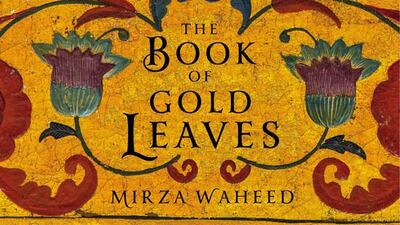Set in 1991 in the Kashmiri city of Srinagar, Mirza Waheed's second novel, The Book of Gold Leaves, owes more than a passing nod to Shakespeare's Romeo and Juliet. Roohi, a girl who "looks like lightning", with long black hair and a "restless heart", prays at her local shrine for "the boy of her dreams to come and take her away". Soon after, she sets eyes on Faiz – a papier-mâché artist who spends his days painting tiny, detailed pictures on boxes sold to tourists – and the rest, as they say, is history.
Roohi “wants a love story” and she pursues her quarry with an unexpected boldness. A clandestine romance quickly blossoms – covert rendezvous hidden away from prying eyes inside the shrine, with Faiz’s younger sister Farhat acting as a go-between for the two lovers. The elders wouldn’t look too fondly on the match since she is a Sunni and he a Shia, and thus a gulf lies between them.
On discovering exactly which family her beloved hails from, even headstrong Roohi pauses for a moment – images of her “irate” mother, her “furious, even violent” brother Rumi, and her “tormented” Papa running through her head – but like her Shakespearean predecessor, her heart is stronger than her head, and neither she nor the object of her affection will be dissuaded from the destiny that’s already plotted for them.
Sectarian issues, however, are the least of their troubles. Srinagar is a city seething with violence and rebellion. Farhat’s school is occupied by the military, where now “boys are learning to assemble shining new guns down in the high-walled backyard” and “play with grenade pins in their mouth”; and bunkers have “come up like warts in all of Khanqah, their machine-guns watching everyone and their shadow like an evil jinn”. Indeed, brutality is already so endemic – “the daily killings, the rapes that are only whispered about, the arson and the plunder that hardly moves anyone any more for there is too much of it everywhere, the incarceration of thousands, the flight of the innocents, the murder and decay of this once magnificent city and, most of all, the frightened withdrawal of many from their own lives and the stunned faces of the grief-stricken people” – that the two communities, each as helpless against the commanding military forces as the other, want no additional strife.
At first the lovers continue to arrange their trysts regardless, but as life in the city is steadily curtailed, Faiz downs his paintbrushes and takes up arms instead, travelling to Pakistan for training at a secret camp.
The city he leaves behind is a city under siege. A “round-the-clock curfew” descends – “All movement proscribed. All meetings banned. All life besieged” – a “deathly calm” settles across it as “soldiers circle the area from all sides”. But Faiz is not the only one doing his bit. Rumi allies himself with the New Salvation Front, supposedly in a fight for freedom, but unbeknown to him his involvement occasions events that eventually play out with tragic consequences for all.
Much of Waheed’s writing is incredibly beautiful, and there’s a delicacy that reminds me of the images Faiz is described as painting on his papier-mâché boxes, but this fragility sometimes carries across into the writing, creating a sort of gauzy distance between the reader and the action unfolding on the pages. That said, Waheed’s tender portrait of his star-crossed lovers sits in stark contrast to his depiction of a city and its inhabitants beset by terror; and against this simmering background, Roohi and Faiz’s against-all-odds love story shines out brightly as a beacon of hope.
Roohi doesn’t just get her man, she gets her love story too as news of her and Faiz’s romance gains “something of a folk status, a word-of-mouth fame among the youth of the area” before spreading across the entire city. When people ask her why – why a Shia boy, and a militant Shia boy at that? – her answer is simple: “I didn’t have a choice, did I? I think it was written before we were born.” In a world where nobody knows what tomorrow will bring, this notion of predestination is a soothing one.
Lucy Scholes is a freelance journalist who lives in London.

